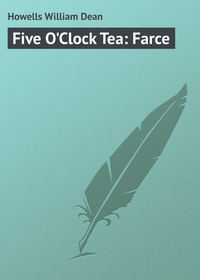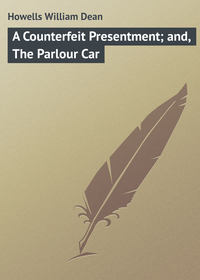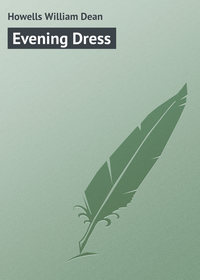
A Boy's Town
Before the Hydraulic was opened, the pork-houses were the chief public attraction to the boys, and they haunted them, with a thrilling interest in the mysteries of pork-packing which none of their sensibilities revolted from. Afterwards, the cotton-mills, which were rather small brick factories, though they looked so large to the boys, eclipsed the pork-house in their regard. They were all wild to work in the mills at first, and they thought it a hardship that their fathers would not let them leave school and do it. Some few of the fellows that my boy knew did get to work in the mills; and one of them got part of his finger taken off in the machinery; it was thought a distinction among the boys, and something like having been in war. My boy's brother was so crazy to try mill-life that he was allowed to do so for a few weeks; but a few weeks were enough of it, and pretty soon the feeling about the mills all quieted down, and the boys contented themselves with their flumes and their wheel-pits, and the head-gates that let the water in on the wheels; sometimes you could find fish under the wheels when the mills were not running. The mill-doors all had "No Admittance" painted on them; and the mere sight of the forbidding words would have been enough to keep my boy away, for he had a great awe of any sort of authority; but once he went into the mill to see his brother; and another time he and some other boys got into an empty mill, where they found a painter on an upper floor painting a panorama of "Paradise Lost." This masterpiece must have been several hundred feet long; the boys disputed whether it would reach to the sawmill they could see from the windows if it was stretched out; and my boy was surprised by the effects which the painter got out of some strips of tinsel which he was attaching to the scenery of the lake of fire and brimstone at different points. The artist seemed satisfied himself with this simple means of suggesting the gleam of infernal fires. He walked off to a distance to get it in perspective, and the boys ventured so close to the paints which he had standing about by the bucketful that it seemed as if he must surely hollo at them. But he did not say anything or seem to remember that they were there. They formed such a favorable opinion of him and his art that they decided to have a panorama; but it never came to anything. In the first place they could not get the paints, let alone the muslin.
Besides the bridge, the school-houses, the court-house and jail, the port-houses and the mills, there was only one other public edifice in their town that concerned the boys, or that they could use in accomplishing the objects of their life, and this was the hall that was built while my boy could remember its rise, for public amusements. It was in this hall that he first saw a play, and then saw so many plays, for he went to the theatre every night; but for a long time it seemed to be devoted to the purposes of mesmerism. A professor highly skilled in that science, which has reappeared in these days under the name of hypnotism, made a sojourn of some weeks in the town, and besides teaching it to classes of learners who wished to practise it, gave nightly displays of its wonders. He mesmerized numbers of the boys, and made them do or think whatever he said. He would give a boy a cane, and then tell him it was a snake, and the boy would throw it away like lightning. He would get a lot of boys, and mount them on chairs, and then tell them that they were at a horse-race, and the boys would gallop astride of their chairs round and round till he stopped them. Sometimes he would scare them almost to death, with a thunder-storm that he said was coming on; at other times he would make them go in swimming, on the dusty floor, and they would swim all over it in their best clothes, and would think they were in the river.
There were some people who did not believe in the professor, or the boys either. One of these people was an officer of the army who was staying a while in the Boy's Town, and perhaps had something to do with recruiting troops for the Mexican War. He came to the lecture one night, and remained with others who lingered after it was over to speak with the professor. My boy was there with his father, and it seemed to him that the officer smiled mockingly at the professor; angry words passed, and then the officer struck out at the professor. In an instant the professor put up both his fists; they flashed towards the officer's forehead, and the officer tumbled backwards. The boy could hardly believe it had happened. It seemed unreal, and of the dreamlike quality that so many facts in a child's bewildered life are of.
There were very few places of amusement or entertainment in the Boy's Town that were within a boy's reach. There were at least a dozen places where a man could get whiskey, but only one where he could get ice-cream, and the boys were mostly too poor and too shy to visit this resort. But there used to be a pleasure-garden on the outskirts of the town, which my boy remembered visiting when he was a very little fellow, with his brother. There were two large old mulberry-trees in this garden, and one bore white mulberries and the other black mulberries, and when you had paid your fip to come in, you could eat all the mulberries you wanted, for nothing. There was a tame crow that my boy understood could talk if it liked; but it only ran after him, and tried to bite his legs. Besides this attraction, there was a labyrinth, or puzzle, as the boys called it, of paths that wound in and out among bushes, so that when you got inside you were lucky if you could find your way out. My boy, though he had hold of his brother's hand, did not expect to get out; he expected to perish in that labyrinth, and he had some notion that his end would be hastened by the tame crow. His first visit to the pleasure-garden was his last; and it passed so wholly out of his consciousness that he never knew what became of it any more than if it had been taken up into the clouds.
He tasted ice-cream there for the first time, and had his doubts about it, though a sherry-glass full of it cost a fip, and it ought to have been good for such a sum as that. Later in life, he sometimes went to the saloon where it was sold in the town, and bashfully gasped out a demand for a glass, and ate it in some sort of chilly back-parlor. But the boys in that town, if they cared for such luxuries, did not miss them much, and their lives were full of such vivid interests arising from the woods and waters all about them that they did not need public amusements other than those which chance and custom afforded them. I have tried to give some notion of the pleasure they got out of the daily arrival of the packet in the Canal Basin; and it would be very unjust if I failed to celebrate the omnibus which was put on in place of the old-fashioned stage-coaches between the Boy's Town and Cincinnati. I dare say it was of the size of the ordinary city omnibus, but it looked as large to the boys then as a Pullman car would look to a boy now; and they assembled for its arrivals and departures with a thrill of civic pride such as hardly any other fact of the place could impart.
My boy remembered coming from Cincinnati in the stage when he was so young that it must have been when he first came to the Boy's Town. The distance was twenty miles, and the stage made it in four hours. It was this furious speed which gave the child his earliest illusion of trees and fences racing by while the stage seemed to stand still. Several times after that he made the journey with his father, seeming to have been gone a long age before he got back, and always so homesick that he never had any appetite at the tavern where the stage stopped for dinner midway. When it started back, he thought it would never get off the city pave and out from between its lines of houses into the free country. The boys always called Cincinnati "The City." They supposed it was the only city in the world.
Of course there was a whole state of things in the Boy's Town that the boys never knew of, or only knew by mistaken rumors and distorted glimpses. They had little idea of its politics, or commerce, or religion that was not wrong, and they only concerned themselves with persons and places so far as they expected to make use of them. But as they could make very little use of grown persons or public places, they kept away from them, and the Boy's Town was, for the most part, an affair of water-courses, and fields and woods, and the streets before the houses, and the alleys behind them.
Nearly all the houses had vegetable gardens, and some of them had flower-gardens that appeared princelier pleasaunces to my boy than he has ever seen since in Europe or America. Very likely they were not so vast or so splendid as they looked to him then; but one of them at least had beds of tulips and nasturtiums, and borders of flags and pinks, with clumps of tiger-lilies and hollyhocks; and in the grassy yard beside it there were high bushes full of snow-balls, and rose-trees with moss-roses on them. In this superb domain there were two summer-houses and a shed where bee-hives stood; at the end of the garden was a bath-house, and you could have a shower-bath, if you were of a mind to bring the water for it from the pump in the barn-yard. But this was all on a scale of unequalled magnificence; and most of the houses, which were mostly of wood, just had a good big yard with plum-trees and cherry-trees in it; and a vegetable garden at one side that the boy hated to weed. My boy's grandfather had a large and beautiful garden, with long arbors of grapes in it, that the old gentleman trimmed and cared for himself. They were delicious grapes; and there were black currants, which the grandfather liked, because he had liked them when he was a boy himself in the old country, but which no Boy's Town boy could have been induced to take as a gracious gift. Another boy had a father that had a green-house; he was a boy that would let you pull pie-plant in the garden, and would bring out sugar to let you eat it with in the green-house. His cleverness was rewarded when his father was elected governor of the state; and what made it so splendid was that his father was a Whig.
Every house, whether it had a flower-garden or not, had a woodshed, which was the place where a boy mostly received his friends, and made his kites and wagons, and laid his plots and plans for all the failures of his life. The other boys waited in the woodshed when he went in to ask his mother whether he might do this or that, or go somewhere. A boy always wanted to have a stove in the woodshed and fit it up for himself, but his mother would not let him, because he would have been certain to set the house on fire.
Each fellow knew the inside of his own house tolerably well, but seldom the inside of another fellow's house, and he knew the back-yard better than the front-yard. If he entered the house of a friend at all, it was to wait for him by the kitchen-door, or to get up to the garret with him by the kitchen-stairs. If he sometimes, and by some rare mischance, found himself in the living-rooms, or the parlor, he was very unhappy, and anxious to get out. Yet those interiors were not of an oppressive grandeur, and one was much like another. The parlor had what was called a flowered-carpet or gay pattern of ingrain on its floor, and the other rooms had rag-carpets, woven by some woman who had a loom for the work, and dyed at home with such native tints as butternut and foreign colors as logwood. The rooms were all heated with fireplaces, where wood was burned, and coal was never seen. They were lit at night with tallow-candles, which were mostly made by the housewife herself, or by lard-oil glass lamps. In the winter the oil would get so stiff with the cold that it had to be thawed out at the fire before the lamp would burn. There was no such thing as a hot-air furnace known; and the fire on the hearth was kept over from day to day all winter long, by covering a log at night with ashes; in the morning it would be a bed of coals. There were no fires in bedrooms, or at least not in a boy's bedroom, and sometimes he had to break the ice in his pitcher before he could wash; it did not take him very long to dress.
I have said that they burned wood for heating in the Boy's Town; but my boy could remember one winter when they burned ears of corn in the printing-office stove because it was cheaper. I believe they still sometimes burn corn in the West, when they are too far from a market to sell it at a paying price; but it always seems a sin and a shame that in a state pretending to be civilized food should ever be destroyed when so many are hungry. When one hears of such things one would almost think that boys could make a better state than this of the men.
XX.
TRAITS AND CHARACTERS
In the Boy's Town a great many men gave nearly their whole time to the affairs of the state, and did hardly anything but talk politics all day; they even sat up late at night to do it. Among these politicians the Whigs were sacred in my boy's eyes, but the Democrats appeared like enemies of the human race; and one of the strangest things that ever happened to him was to find his father associating with men who came out of the Democratic party at the time he left the Whig party, and joining with them in a common cause against both. But when he understood what a good cause it was, and came to sing songs against slavery, he was reconciled, though he still regarded the Whig politicians as chief among the great ones, if not the good ones, of the earth. When he passed one of them on the street, he held his breath for awe till he got by, which was not always so very soon, for sometimes a Whig statesman wanted the whole sidewalk to himself, and it was hard to get by him. There were other people in that town who wanted the whole sidewalk, and these were the professional drunkards, whom the boys regarded as the keystones, if not corner-stones, of the social edifice. There were three or four of them, and the boys held them all, rich and poor alike, in a deep interest, if not respect, as persons of peculiar distinction. I do not think any boy realized the tragedy of those hopeless, wasted, slavish lives. The boys followed the wretched creatures, at a safe distance, and plagued them, and ran whenever one of them turned and threatened them. That was because the boys had not the experience to enable them to think rightly, or to think at all about such things, or to know what images of perdition they had before their eyes; and when they followed them and teased them, they did not know they were joining like fiends in the torment of lost souls. Some of the town-drunkards were the outcasts of good homes, which they had desolated, and some had merely destroyed in themselves that hope of any home which is the light of heaven in every human heart; but from time to time a good man held out a helping hand to one of them, and gave him the shelter of his roof, and tried to reclaim him. Then the boys saw him going about the streets, pale and tremulous, in a second-hand suit of his benefactor's clothes, and fighting hard against the tempter that beset him on every side in that town; and then some day they saw him dead drunk in a fence corner; and they did not understand how seven devils worse than the first had entered in the place which had been swept and garnished for them.
Besides the town-drunkards there were other persons in whom the boys were interested, like the two or three dandies, whom their splendor in dress had given a public importance in a community of carelessly dressed men. Then there were certain genteel loafers, young men of good families, who hung about the principal hotel, and whom the boys believed to be fighters of singular prowess. Far below these in the social scale, the boys had yet other heroes, such as the Dumb Negro and his family. Between these and the white people, among whom the boys knew of no distinctions, they were aware that there was an impassable gulf; and it would not be easy to give a notion of just the sort of consideration in which they held them. But they held the Dumb Negro himself in almost superstitious regard as one who, though a deaf-mute, knew everything that was going on, and could make you understand anything he wished. He was, in fact, a master of most eloquent pantomime; he had gestures that could not be mistaken, and he had a graphic dumb-show for persons and occupations and experiences that was delightfully vivid. For a dentist, he gave an upward twist of the hand from his jaw, and uttered a howl which left no doubt that he meant tooth-pulling; and for what would happen to a boy if he kept on misbehaving, he crossed his fingers before his face and looked through them in a way that brought the jail-window clearly before the eyes of the offender.
The boys knew vaguely that his family helped runaway slaves on their way North, and in a community that was for the most part bitterly pro-slavery these negroes were held in a sort of respect for their courageous fidelity to their race. The men were swarthy, handsome fellows, not much darker than Spaniards, and they were so little afraid of the chances which were often such fatal mischances to colored people in that day that one of them travelled through the South, and passed himself in very good company as a Cherokee Indian of rank and education.
As far as the boys knew, the civic affairs of the place were transacted entirely by two constables. Of mayors and magistrates, such as there must have been, they knew nothing, and they had not the least notion what the Whigs whom they were always trying to elect were to do when they got into office. They knew that the constables were both Democrats, but, if they thought at all about the fact, they thought their Democracy the natural outcome of their dark constabulary nature, and by no means imagined that they were constables because they were Democrats. The worse of the two, or the more merciless, was also the town-crier, whose office is now not anywhere known in America, I believe; though I heard a town-crier in a Swiss village not many years ago. In the Boy's Town the crier carried a good-sized bell; when he started out he rang it till he reached the street corner, and then he stopped, and began some such proclamation as, "O, yes! O, yes! O, yes! There will be an auction this evening at early candle-light, at Brown & Robinson's store! Dry goods, boots and shoes, hats and caps, hardware, queen's ware, and so forth, and so forth. Richard Roe, Auctioneer! Come one, come all, come everybody!" Then the crier rang his bell, and went on to the next corner, where he repeated his proclamation. After a while, the constable got a deputy to whom he made over his business of town-crier. This deputy was no other than that reckless boy who used to run out from the printing-office and shoot the turtle-doves; and he decorated his proclamation with quips and quirks of his own invention, and with personal allusions to his employer, who was auctioneer as well as constable. But though he was hail-fellow with every boy in town, and although every boy rejoiced in his impudence, he was so panoplied in the awfulness of his relation to the constabulary functions that, however remote it was, no boy would have thought of trifling with him when he was on duty. If ever a boy holloed something at him when he was out with his crier's bell, he turned and ran as hard as he could, and as if from the constable himself.
The boys knew just one other official, and that was the gauger, whom they watched at a respectful distance, when they found him employed with his mysterious instruments gauging the whiskey in the long rows of barrels on the Basin bank. They did not know what the process was, and I own that I do not know to this day what it was. My boy watched him with the rest, and once he ventured upon a bold and reckless act. He had so long heard that it was whiskey which made people drunk that at last the notion came to have an irresistible fascination for him, and he determined to risk everything, even life itself, to know what whiskey was like. As soon as the gauger had left them, he ran up to one of the barrels where he had seen a few drops fall from his instrument when he lifted it from the bunghole, and plunged the tip of his little finger into the whiskey, and then put it to his tongue. He expected to become drunk instantly, if not to end a town-drunkard there on the spot; but the whiskey only tasted very disgusting; and he was able to get home without help. Still, I would not advise any other boy to run the risk he took in this desperate experiment.
There was a time not long after that when he really did get drunk, but it was not with whiskey. One morning after a rain, when the boys were having fun in one of those open canal-boats with the loose planks which the over-night shower had set afloat, a fellow came up and said he had got some tobacco that was the best kind to learn to chew with. Every boy who expected to be anything in the world expected to chew tobacco; for all the packet-drivers chewed; and it seemed to my boy that his father and grandfather and uncles were about the only people who did not chew. If they had only smoked, it would have been something, but they did not even smoke; and the boy felt that he had a long arrears of manliness to bring up, and that he should have to retrieve his family in spite of itself from the shame of not using tobacco in any form. He knew that his father abhorred it, but he had never been explicitly forbidden to smoke or chew, for his father seldom forbade him anything explicitly, and he gave himself such freedom of choice in the matter that when the boy with the tobacco began to offer it around, he judged it right to take a chew with the rest. The boy said it was a peculiar kind of tobacco, and was known as molasses-tobacco because it was so sweet. The other boys did not ask how he came to know its name, or where he got it; boys never ask anything that it would be well for them to know; but they accepted his theory, and his further statement that it was of a mildness singularly adapted to learners, without misgiving. The boy was himself chewing vigorously on a large quid, and launching the juice from his lips right and left like a grown person; and my boy took as large a bite as his benefactor bade him. He found it as sweet as he had been told it was, and he acknowledged the aptness of its name of molasses-tobacco; it seemed to him a golden opportunity to acquire a noble habit on easy terms. He let the quid rest in his cheek as he had seen men do, when he was not crushing it between his teeth, and for some moments he poled his plank up and down the canal-boat with a sense of triumph that nothing marred. Then, all of a sudden, he began to feel pale. The boat seemed to be going round, and the sky wheeling overhead; the sun was dodging about very strangely. Drops of sweat burst from the boy's forehead; he let fall his pole, and said that he thought he would go home. The fellow who gave him the tobacco began to laugh, and the other fellows to mock, but my boy did not mind them. Somehow, he did not know how, he got out of the canal-boat and started homeward; but at every step the ground rose as high as his knees before him, and then when he got his foot high enough, and began to put it down, the ground was not there. He was deathly sick, as he reeled and staggered on, and when he reached home, and showed himself white and haggard to his frightened mother, he had scarcely strength to gasp out a confession of his attempt to retrieve the family honor by learning to chew tobacco. In another moment nature came to his relief, and then he fell into a deep sleep which lasted the whole afternoon, so that it seemed to him the next day when he woke up, glad to find himself alive, if not so very lively. Perhaps he had swallowed some of the poisonous juice of the tobacco; perhaps it had acted upon his brain without that. His father made no very close inquiry into the facts, and he did not forbid him the use of tobacco. It was not necessary; in that one little experiment he had got enough for a whole lifetime. It shows that, after all, a boy is not so hard to satisfy in everything.
There were some people who believed that tobacco would keep off the fever-and-ague, which was so common then in that country, or at any rate that it was good for the toothache. In spite of the tobacco, there were few houses where ague was not a familiar guest, however unwelcome. If the family was large, there was usually a chill every day; one had it one day, and another the next, so that there was no lapse. This was the case in my boy's family, after they moved to the Faulkner house, which was near the Basin and its water-soaked banks; but they accepted the ague as something quite in the course of nature, and duly broke it up with quinine. Some of the boys had chills at school; and sometimes, after they had been in swimming, they would wait round on the bank till a fellow had his chill out, and then they would all go off together and forget about it. The next day that fellow would be as well as any one; the third day his chill would come on again, but he did not allow it to interfere with his business or pleasure, and after a while the ague would seem to get tired of it, and give up altogether. That strange earth-spirit who was my boy's friend simply beat the ague, as it were, on its own ground. He preferred a sunny spot to have his chill in, a cosy fence-corner or a warm back door-step, or the like; but as for the fever that followed the chill, he took no account of it whatever, or at least made no provision for it.









